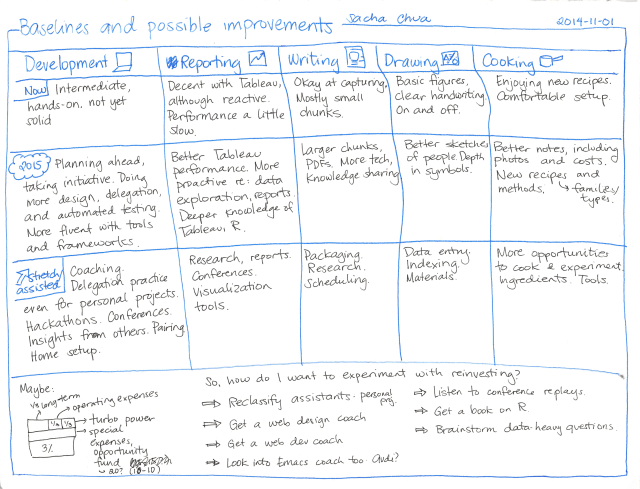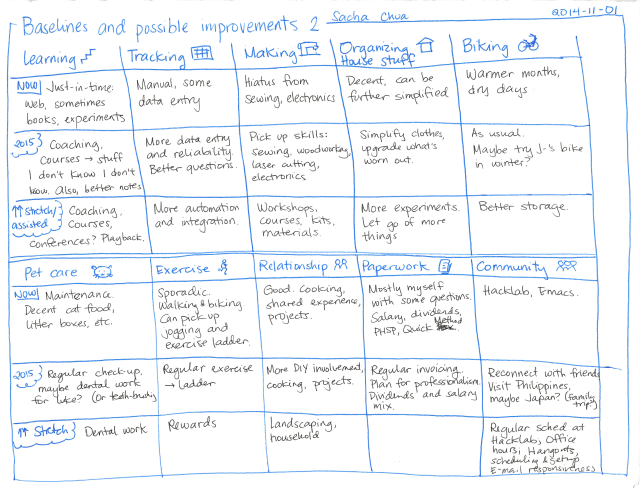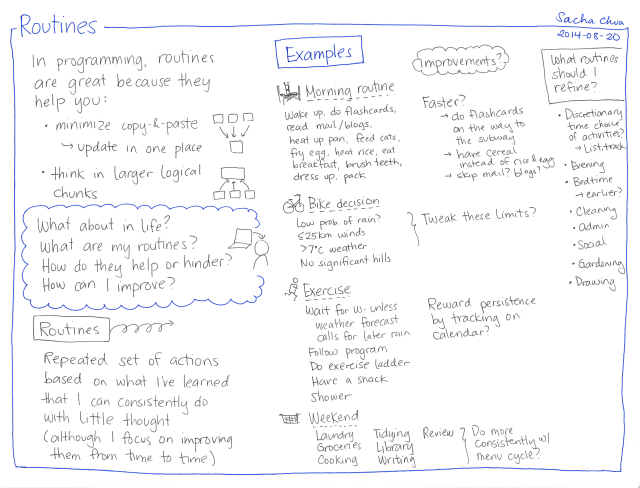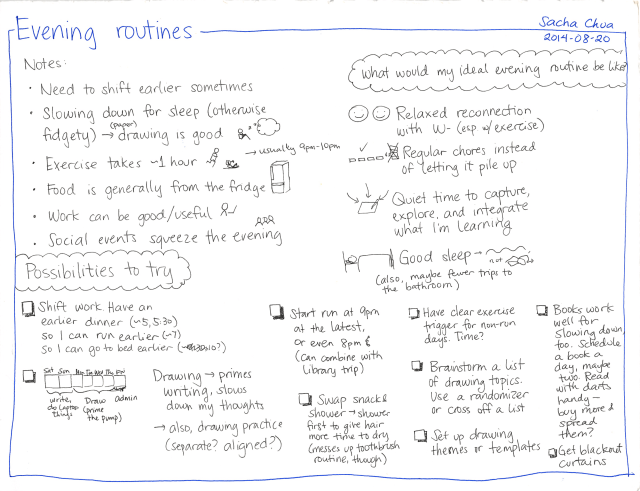… though I sometimes amuse myself with suggesting and arranging such little elegant compliments as may be adapted to ordinary occasions, I always wish to give them as unstudied an air as possible.
Mr. Collins in Pride and Prejudice (Jane Austen)
After three successive weekends (three!) with parties, I want to think about small talk and how I can tweak it. Small talk is unavoidable, but there are things you can do to nudge it one way or another. I like having conversations that move me or other people forward, even if it's just by a little bit.
So, what do I want to do with small talk?
- Help other people feel comfortable enough to open up about some memorable interest or quirk
- Find topics of common interest for further conversation
- Find a way to help or a reason to follow up
We could do the ritualistic weather/profession/how-do-you-know-the-host conversations, or we could change the level of the conversation so that it goes beyond the repetitive gestures that only skim the surface. I could chat as a way of passing time (possibly bumping into interesting thoughts along the way), or I can more deliberately check for things I'm interested in while staying open to the serendipity of random connections. What do I want to be able to frequently do through conversation?
- Identify possible meetup or global community members – reassure them that this is a thing and that lots of people are interested in it; point people to resources (Emacs, QS, visual thinking)
- Talk shop with other geeks to find out about tech and business things worth looking into
- Other geeks (non-tech): learn more about different fields
- Non-geeks: See if there's anything I can help with easily (books? ideas?)
I could either dig into people's interests or be memorable enough so that people look me up afterwards. Many people open up about their interests only when they feel comfortable. What makes people feel more comfortable? It helps to establish a sense of similarity and shared understanding.
People have different strategies for establishing similarity. I know a few people who use the “You look really familiar…” approach (even if the other person doesn't) because rattling off schools, companies, associations, and interests tends to reveal something in common.
I like building on stuff I've overheard or asking questions about common context. That's one of the reasons why I like events with presentations more than events that are focused only on networking – the presentation gives us something to start talking about.
In terms of helping people get to know me and find topics of shared interest, I use short disclosures with high information value.
Consulting: “I'm a consultant” has low information value: it's vague and it wouldn't establish much similarity even if the other person was also a consultant. I rarely use it unless I'm tired, I want to shift the focus back on the other person quickly, or I sense they're also going through the motions. (Or I want to see at what point their eyes glaze over…)
Emacs: “I'm working on some Emacs projects” has high information value when talking to tech geeks, almost like a secret handshake that lets us shift the conversation. (I talk faster, go into more detail, and use more jargon when talking to fellow geeks, so it's almost like the 56kbps modem handshake.) I'm female, I don't wear geeky T-shirts, and I don't work for a technical company or in a technical position, so it helps to verbally establish geek cred quickly without making a big deal out of it.
Data analysis: For geeks of other fields, Emacs is low-information, but Quantified Self and data analysis seems to be a good way to establish that similarity quickly. It works well with people who are interested in science, tech, engineering, math, or even continuous improvement. Litter box analysis is surprisingly engaging as a cocktail party topic, or at least it's easy to for people to ask follow-up questions about if they want to.
Sketchnoting: People (including most of the ones who don't identify as geeks) tend to be curious about my sketchnoting, since it's visual, easy to understand, and uncommon. That said, I need to get better at handling the usual follow-ups. People tend to say things like “You draw so well” or “I could never do something like that.” I want to nip that in the bud and get people to realize that they can do this too. Pointing out that I draw stick figures like a 5-year-old doesn't seem to do the trick (“Ah, but you know what to leave out” and “But you're doing this while listening – that's hard”). Maybe a little humour, poking fun at the idea of going to an art school that specializes in stick figures or learning how to not fall asleep in presentations? About one in fifty people I talk to recognizes this as something they do on their own or that they want to do, and it's good to link them up with the global community. For most people, though, I feel slightly more comfortable focusing on ideas they want t olearn more about and sending them sketchnotes if there's a fit.
Semi-retirement: This experiment with semi-retirement can be a good conversational hook for prompting curiosity. It usually follows this sequence: semi-retired -> “aren't you a little young? what do you mean?” -> tracked, saved up, experimenting. It tends to be too detached from people's lives, though – many people don't think they can pull it off, even experienced freelancers who are doing most of it already.
Variety: If I don't know how someone identifies, it's fun to answer the “What do you do?” question (which tries to pigeonhole someone into a neatly understandable job title) with a sense of variety: “I do a lot of different things! This week, I …”
Going forward
For the next few events, I think I'll experiment with doing the tech/non-tech/non-geek identification earlier, or going into that with an opening based on variety. I could name an example each for tech, non-tech, and non-geek, and see which one they dig into. As for digging into people's interests, maybe an open-ended survey-type question would be an interesting way to help people open up while still collecting data in case people haven't thought about how to make themselves easier to get to know. Hmm…
Small talk might be small, but if I have thousands of conversations over the years, I might as well keep learning from it. How have you tweaked how you do small talk?




